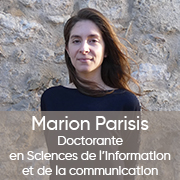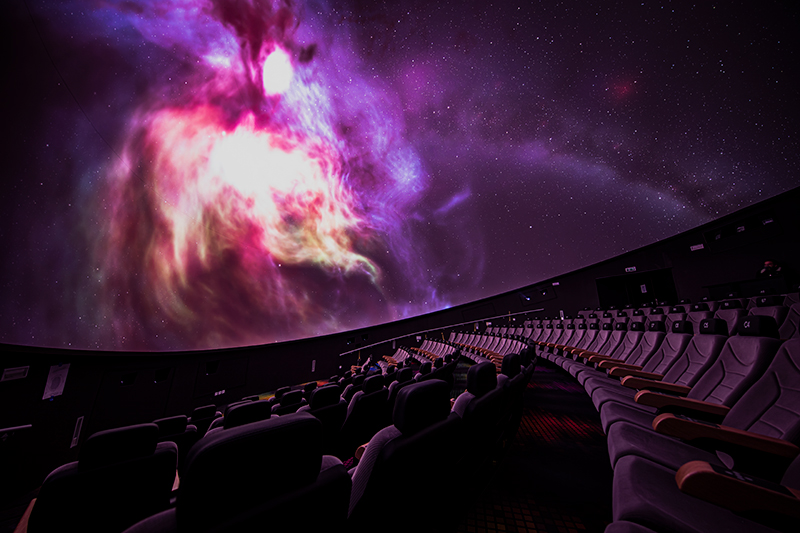[Portrait] Marion Parisis, PhD student in Information and Communication Sciences at the CNE
What is your research about?
I am doing a doctorate under an Industrial Agreement for Training through Research (CIFRE). I am working in collaboration with a private company, RSA Cosmos - Konica Minolta, based near Saint-Etienne (42). This company builds planetariums. It develops and markets planetarium software which allows images of the Universe to be displayed in three dimensions and in real time on the planetarium screen. The latter is used by scientific mediators during sessions for various audiences.

In my work, I seek to uncover the way in which planetarium software - which proposes virtual environments within which the Universe is reconstructed - allows an exploration of celestial objects and physical phenomena and thus ultimately access to a reality constructed by scientists. To do this, I analyse the relationship between the images of celestial objects (stars, galaxies, etc.) offered by this planetarium software and the knowledge (and images) produced by astrophysics researchers. In a complementary way, I analyse the way in which scientific mediators appropriate these images and use them during planetarium sessions. I am interested in the use of narrative and certain forms of fiction as mediation modalities that allow the mediator to make the public access to astrophysical knowledge.
What are your current scientific activities?
In June 2022, I participated in the French Society for Information and Communication Sciences during which I presented a Scientific Poster about my research entitled "Digital Planetariums: virtual environments, fiction and human mediation". Last September, I also presented part of my work during the seminar Heritage on display of the Centre Norbert Elias, which is part of the laboratory's "Culture: processes and forms" theme.
I also take part in popularisation activities: organisation and running of a Café des Sciences in Avignon entitled "The power of images"; publication of a short article in the professional journal Planetariums.
For 2023, I plan to produce several papers. I regularly update the publications on my page:
https://centrenorbertelias.cnrs.fr/equipes-de-recherche/doctorants/marionparisis/.
Why did you choose to work in academic research?
Before doing my doctorate, I was a scientific mediator in an astronomy association that owns a planetarium. I quickly realised that few studies had been carried out in France on these mediation devices, which are complex to use: they are technical and digital devices that must be mastered in front of the public and whose scientific content is complex because they concern celestial objects and phenomena whose scales are disproportionate for human understanding.
I would like to contribute to current studies in Information and Communication Sciences by working on planetariums as scientific mediation devices. Moreover, through this research, I hope to contribute to the knowledge of digital planetariums in their particularity, namely, to involve a scientific mediator and a digital device to transmit, raise awareness and discover knowledge in astronomy and astrophysics.
What advice would you give to students who want to do research?
To benefit from your PhD experience, I think you have to be passionate about your subject, to want to dig into it, to question it. But above all, a PhD is not a solitary activity (at least in my case). Knowing how to surround yourself, being able to exchange with professionals, researchers and PhD students offers a wealth of information that you should take advantage of to develop, enrich and question your work. It allows you to have other views, other opinions and it helps you to take a step back from your work, which is sometimes difficult to do when you have your head in the sand.
What object or image from your business best illustrates you?
This picture shows the interior of the planetarium of the La Coupole museum located in Helfaut (62570). On the screen of the dome, we can see the Orion nebula available in the planetarium software I am studying. My fieldwork is carried out in this type of structure.

The laboratory
The Norbert Elias Centre (UMR 8562) brings together researchers from different disciplines who are convinced of the unity of the human and social sciences. The laboratory is located on the EHESS Marseille campus at Vieille Charité and on the Hannah Arendt campus at Avignon University. It brings together 50 researchers, 80 doctoral students and a support team of about ten people who work on the analysis and description of social worlds.
>> Read more
The portraits
To discover all our portraits, go here.
Mis à jour le 31 March 2023